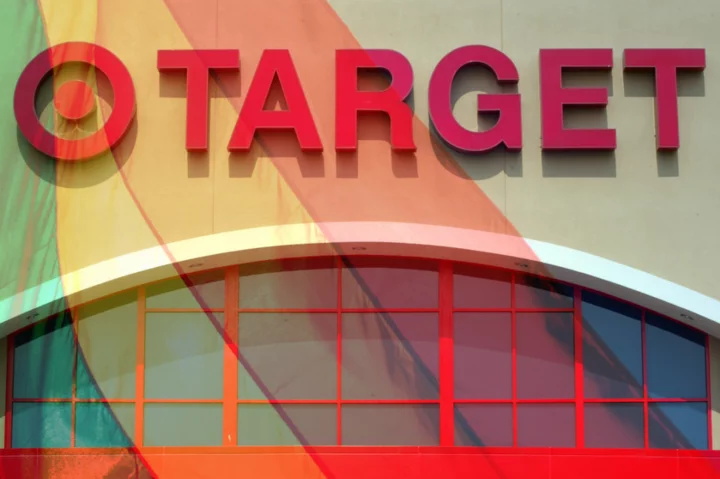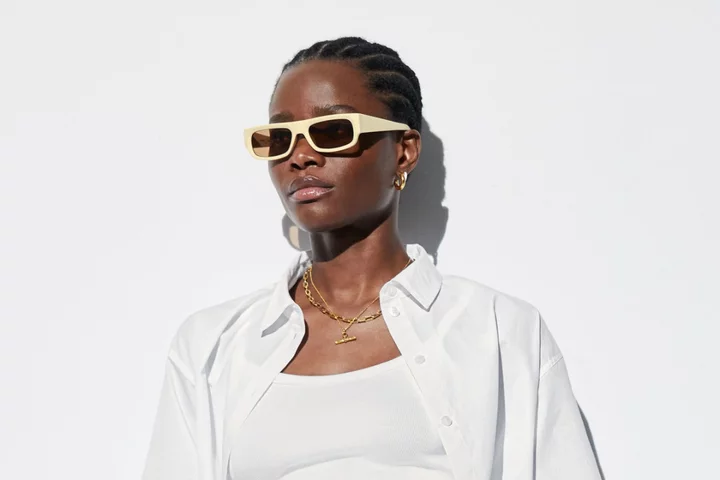When Walmart approached Gay Pride Apparel founders Sergio Aragon and Jesus Gutierrez to launch an exclusive Pride Month collection this June, it felt like a “full circle” moment for the first-generation Mexican Americans, who have been shopping at the discount big-box store their entire lives. “My family grew up low-income and Walmart was all we had,” Gutierrez tells The Independent. “If I would’ve seen a Pride display at age nine, it would’ve been so special.” Little did the founders of Gay Pride Apparel – whose mission is to celebrate and empower the LGBT+ community through clothing and accessories – know that they would soon be on the receiving end of “violent threats” from protestors, angry over the Pride Month merchandise. They’re not alone. This month, both queer designers and customers have faced numerous attacks from anti-LGBT+ groups over Pride Month collections. Target was infamously at the centre of significant backlash over its wide-ranging Pride merchandise. The outrage began after conservative media outlets falsely claimed Target was selling “tuck-friendly” bathing suits in the children’s department. Rather, the “tuck-friendly” swimsuits were designed for trans women who have not had gender-affirming surgery, but the misinformation didn’t stop there. Erik Carnell, a gay trans man based in the United Kingdom, received “hundreds upon hundreds of hate messages” for his queer inclusive brand Abprallen, which was also featured in Target’s Pride collection. While the retailer sold three of his designs in its stores, it was his items using occult imagery that received conservative backlash, despite not being sold in Target stores at all. In Montana, a transgender couple was harassed by a far-right extremist who destroyed a Pride display at a Target in Missoula, telling the couple to “enjoy [the merchandise] while you can.” Several videos also showed anti-LGBT+ protesters harassing Target employees, destroying Pride Month displays, and shouting “Your kids can’t be gay!” inside stores. In response, Target announced it was pulling some of its Pride Month merchandise after several employees experienced “confrontational behaviour” from angry customers. “Since introducing this year’s collection, we’ve experienced threats impacting our team members’ sense of safety and well-being while at work,” the retailer said in a statement. “Given these volatile circumstances, we are making adjustments to our plans, including removing items that have been at the centre of the most significant confrontational behaviour. Our focus now is on moving forward with our continuing commitment to the LGBTQIA+ community and standing with them as we celebrate Pride Month and throughout the year.” Target wasn’t the only major retailer to face conservative outrage and boycotts from anti-LGBT+ groups. Kohl’s, Adidas, The North Face, and Starbucks have all been criticised for their Pride Month campaigns and collections. And most notable of all was Anheuser-Busch, which featured trans influencer Dylan Mulvaney in a social media promotional post for Bud Light back in April. From parades, to demonstrations, to even marketing, LGBT+ empowerment has dominated the month of June for more than 50 years. But this year’s Pride comes amidst an unsettling time for the queer community, as America’s largest LGBT+ civil rights group issues a “state of emergency” for LGBT+ people living in the United States. Hundreds of bills have been introduced in state legislatures impacting the queer community, specifically targeting trans and nonbinary people. Out of 220 bills, more than 75 have been signed into law, and at least 19 states have enacted policies banning gender affirming healthcare for young trans people. This Pride Month, it seems as though the minority of Americans (more than 70 per cent of people in the US support same-sex marriage) are speaking the loudest. It may be because conservative legislation, largely targeting trans Americans, has emboldened anti-LGBT+ individuals to feel comfortable attacking the queer community in public spaces. However, many LGBT+ business owners believe it’s the increasing visibility and popularity of queer-inclusive fashion that has angered protesters. In fact, queer-owned businesses have generated more than $1.7 trillion in economic impact, according to the National LGBT Chamber of Commerce. The purchasing power of the queer community is without question, hence the age-old trend of corporations “rainbow-washing” during the month of June – slapping a rainbow on their products or logos to signal themselves as “gay-friendly,” rather than holding themselves accountable in their support for the LGBT+ community. Queer-owned businesses have existed for decades, and the ongoing attacks against retailers supporting them during Pride has only made them feel more empowered. TomboyX is a queer-founded fashion brand that designs gender-neutral undergarments for people of all sizes and across the gender spectrum. In 2012, co-founders Fran Dunaway and Naomi Gonzalez set out to make the perfect gender-neutral boxer brief after recognising a gap in the market for inclusive underwear. Today, TomboyX’s underwear and loungewear can be found in major US retailers like Nordstrom. “From the very beginning, we always recognised that there was this white space in fashion that was very much gendered,” Gonzalez tells The Independent. Her wife, Dunaway, added: “I think that for us it was just really important to be inclusive because we’re part of the LGBTQ+ community. We’re a married couple and so we really felt what it was like to not be seen and represented in fashion.” While TomboyX may have started the conversation on queer-inclusive fashion more than a decade ago, it’s continued to be a part of it. “There’s a sense of pride in just having more queer, non-binary designers out in the world, expressing themselves in all the ways that they see fit and having accessibility to the broader audience that way too,” Gonzalez says. “I think this isn’t about, you know, just one brand or anything like that. This is very much a movement. It’s very much an expression of the importance of being yourself.” The movement for non-gendered clothing has made headway in recent years, having much to do with the growing number of young Americans who self-identify as members of the LGBT+ community. In fact, the number has almost doubled, with a record one in five Gen Z adults identifying as LGBTQ. “In the past four or five years that we’ve been in this industry as a company, we definitely notice an increase of people coming to us asking not just for gender-inclusive clothing, but for non-binary related items,” says Gutierrez. While the demand for gender-inclusive fashion has grown in popularity, public backlash from right-wing media has forced companies to finally take a stance on LGBT+ rights. For Target, it responded by removing some of its Pride merchandise from stores, much to the dismay of its queer customers and LGBT+ allies. “It’s terribly disappointing that Target is caving in to threats of violence from anti-LGBTQ bigots by removing Pride Month displays,” tweeted Jon Cooper, Democratic majority leader of New York’s Suffolk County. “If these extremists decide to attack displays celebrating Black History Month next, will Target remove those as well?” “Target should not be responding so easily to criticism and threats from the likes of the Proud Boys,” said Human Rights Campaign President Kelley Robinson in a statement. “Target should put the products back on the shelves and ensure [its] Pride displays are visible on the floors, not pushed into the proverbial closet. That’s what the bullies want. Target must be better.” The backlash has shown real financial consequences for companies too. Weeks after Anheuser-Busch received pushback from conservative public figures over its partnership with trans influencer Dylan Mulvaney – notably Kid Rock, who posted a video of himself shooting cases of (purchased) Bud Light – the company released an underwhelming statement that it “never intended to be part of a discussion that divides people”. However, Anheuser-Busch made no mention of Mulvaney, nor the transphobic rhetoric perpetuated during the backlash. Not only did Bud Light’s retail sales in the US drop 24 per cent in early June, but the Human Rights Campaign has rescinded the company’s benchmark equality and inclusion rating. Emma McIlroy is the co-founder of Wildfang, a clothing brand based in Portland, Oregon, with the mission to rethink gender norms in fashion. For McIlroy, the recent financial results from companies like Anheuser-Busch are “terrifying” because it influences how brands will support the LGBT+ community in the future. “I think we live in a space right now where we’ve built a forum for divisiveness, and that’s what we’ve leaned into. None of it’s particularly shocking,” McIlroy says. “Once financial results take a complete beating, as a result of some of those decisions, that’s terrifying for me because I think you’re gonna see a lot of brands make different decisions, and that’s tough. It’s going to be very hard for other public CEOs to stand up for what they want to stand up for.” For others, they were disappointed to see Target facing such conservative backlash, considering the brand has largely been known as a leader in providing inclusive clothing during Pride Month. Unlike other major companies, the retailer has gone so far as to source small, queer business owners to join its Pride campaigns. JZD, a queer-owned, family-operated small business based in Texas, spent an entire year designing custom pieces for Target’s national Pride campaign. Ashley Molesso and Chess Needham, a queer and trans couple based in upstate New York, were asked to have items from their small gift and stationery company – Ash + Chess – featured in Target stores too. “Lots of companies have done a much better job of moving away from private labels, being inclusive of queer designers and queer brands,” says Rob Smith, CEO and founder of The Phluid Project. “I’ve seen that, this year, really come to light. I think Target is actually one of the companies that did it best, really creating much more space for queer brands.” While Target may have been setting an example for retailers during Pride Month, perhaps it’s when we look to major corporations to take a stance on social issues that we run into problems. Has the public outrage towards Pride collections become a turning point for corporate allyship? “I think every corporation really needs to decide where they’re going to stand in terms of who they think is their market,” says Sophie Bjork-James, an assistant professor of anthropology at Vanderbilt University. “Is it going to be a vocal minority or is it going to be everybody? I think that what we’ve seen, with some of the recent decisions by corporations, is that they are not completely sure what their stance is.” McIlroy thinks it’s a “non-starter” that companies should be prepared to support the communities that they “commercialise,” saying: “To do one without the other, it means you stand for nothing and it means you stand for no one.” It could be argued that Target did indeed take a stance on LGBT+ issues when it removed merchandise from its Pride Month collection. Some critics believe that, by rescinding its gender-inclusive items, Target “encouraged further acts of violent intimidation from the far-right”. Others may believe that none of this is Target’s fault, and that the company simply stood by its responsibility to protect employees. “I think a lot of companies are being reflective and thinking, where are we right now? Are we a company that’s grounded in culture, grounded in community? If you are, then yeah, go have a great Pride campaign,” says Smith. “But I don’t think it’s time to pull away. I do think it’s time to lean in. I think stepping away all together, for fear, would be really disappointing.” Despite the pushback from a small, but vocal minority opposing Pride Month, many queer designers believe the right-wing outrage actually draws more attention (and money) to small queer-owned brands, as well as the issues facing the LGBT+ community. However, showing support during Pride Month does not mean simply purchasing a T-shirt with a nondescript rainbow printed on it from your local big-box chain store. In fact, amplifying queer voices that often go unheard should happen year-round. “In the middle of this chaos, it just shows how much progress there’s been – that both of the largest retailers did have a collection for Pride,” says Gutierrez. “That’s why there was backlash, because it’s so big and in your face, that I want to take that as the winning moment. Like, look at that. We’re talking about queer rights now because you guys decided to come for us.” Read More Kohl’s threatened with boycott over Pride-themed clothes after Target forced to remove collection over threats Trans designer behind Target’s Pride collection flooded with orders as he responds to backlash Starbucks denies claims that it's banning Pride displays but union organizers are skeptical Rihanna steps down as CEO of Savage X Fenty Glastonbury 2023: All the best fashion at the biggest UK festival of the year Sarah Jessica Parker rewears iconic Vivienne Westwood wedding dress in And Just Like That
When Walmart approached Gay Pride Apparel founders Sergio Aragon and Jesus Gutierrez to launch an exclusive Pride Month collection this June, it felt like a “full circle” moment for the first-generation Mexican Americans, who have been shopping at the discount big-box store their entire lives.
“My family grew up low-income and Walmart was all we had,” Gutierrez tells The Independent. “If I would’ve seen a Pride display at age nine, it would’ve been so special.”
Little did the founders of Gay Pride Apparel – whose mission is to celebrate and empower the LGBT+ community through clothing and accessories – know that they would soon be on the receiving end of “violent threats” from protestors, angry over the Pride Month merchandise.
They’re not alone. This month, both queer designers and customers have faced numerous attacks from anti-LGBT+ groups over Pride Month collections. Target was infamously at the centre of significant backlash over its wide-ranging Pride merchandise.
The outrage began after conservative media outlets falsely claimed Target was selling “tuck-friendly” bathing suits in the children’s department. Rather, the “tuck-friendly” swimsuits were designed for trans women who have not had gender-affirming surgery, but the misinformation didn’t stop there.
Erik Carnell, a gay trans man based in the United Kingdom, received “hundreds upon hundreds of hate messages” for his queer inclusive brand Abprallen, which was also featured in Target’s Pride collection. While the retailer sold three of his designs in its stores, it was his items using occult imagery that received conservative backlash, despite not being sold in Target stores at all.
In Montana, a transgender couple was harassed by a far-right extremist who destroyed a Pride display at a Target in Missoula, telling the couple to “enjoy [the merchandise] while you can.” Several videos also showed anti-LGBT+ protesters harassing Target employees, destroying Pride Month displays, and shouting “Your kids can’t be gay!” inside stores.
In response, Target announced it was pulling some of its Pride Month merchandise after several employees experienced “confrontational behaviour” from angry customers. “Since introducing this year’s collection, we’ve experienced threats impacting our team members’ sense of safety and well-being while at work,” the retailer said in a statement. “Given these volatile circumstances, we are making adjustments to our plans, including removing items that have been at the centre of the most significant confrontational behaviour. Our focus now is on moving forward with our continuing commitment to the LGBTQIA+ community and standing with them as we celebrate Pride Month and throughout the year.”
Target wasn’t the only major retailer to face conservative outrage and boycotts from anti-LGBT+ groups. Kohl’s, Adidas, The North Face, and Starbucks have all been criticised for their Pride Month campaigns and collections. And most notable of all was Anheuser-Busch, which featured trans influencer Dylan Mulvaney in a social media promotional post for Bud Light back in April.
From parades, to demonstrations, to even marketing, LGBT+ empowerment has dominated the month of June for more than 50 years. But this year’s Pride comes amidst an unsettling time for the queer community, as America’s largest LGBT+ civil rights group issues a “state of emergency” for LGBT+ people living in the United States. Hundreds of bills have been introduced in state legislatures impacting the queer community, specifically targeting trans and nonbinary people. Out of 220 bills, more than 75 have been signed into law, and at least 19 states have enacted policies banning gender affirming healthcare for young trans people.
This Pride Month, it seems as though the minority of Americans (more than 70 per cent of people in the US support same-sex marriage) are speaking the loudest. It may be because conservative legislation, largely targeting trans Americans, has emboldened anti-LGBT+ individuals to feel comfortable attacking the queer community in public spaces.
However, many LGBT+ business owners believe it’s the increasing visibility and popularity of queer-inclusive fashion that has angered protesters. In fact, queer-owned businesses have generated more than $1.7 trillion in economic impact, according to the National LGBT Chamber of Commerce. The purchasing power of the queer community is without question, hence the age-old trend of corporations “rainbow-washing” during the month of June – slapping a rainbow on their products or logos to signal themselves as “gay-friendly,” rather than holding themselves accountable in their support for the LGBT+ community.
Queer-owned businesses have existed for decades, and the ongoing attacks against retailers supporting them during Pride has only made them feel more empowered.
TomboyX is a queer-founded fashion brand that designs gender-neutral undergarments for people of all sizes and across the gender spectrum. In 2012, co-founders Fran Dunaway and Naomi Gonzalez set out to make the perfect gender-neutral boxer brief after recognising a gap in the market for inclusive underwear. Today, TomboyX’s underwear and loungewear can be found in major US retailers like Nordstrom.
“From the very beginning, we always recognised that there was this white space in fashion that was very much gendered,” Gonzalez tells The Independent. Her wife, Dunaway, added: “I think that for us it was just really important to be inclusive because we’re part of the LGBTQ+ community. We’re a married couple and so we really felt what it was like to not be seen and represented in fashion.”
While TomboyX may have started the conversation on queer-inclusive fashion more than a decade ago, it’s continued to be a part of it. “There’s a sense of pride in just having more queer, non-binary designers out in the world, expressing themselves in all the ways that they see fit and having accessibility to the broader audience that way too,” Gonzalez says. “I think this isn’t about, you know, just one brand or anything like that. This is very much a movement. It’s very much an expression of the importance of being yourself.”
The movement for non-gendered clothing has made headway in recent years, having much to do with the growing number of young Americans who self-identify as members of the LGBT+ community. In fact, the number has almost doubled, with a record one in five Gen Z adults identifying as LGBTQ.
“In the past four or five years that we’ve been in this industry as a company, we definitely notice an increase of people coming to us asking not just for gender-inclusive clothing, but for non-binary related items,” says Gutierrez.
While the demand for gender-inclusive fashion has grown in popularity, public backlash from right-wing media has forced companies to finally take a stance on LGBT+ rights. For Target, it responded by removing some of its Pride merchandise from stores, much to the dismay of its queer customers and LGBT+ allies.
“It’s terribly disappointing that Target is caving in to threats of violence from anti-LGBTQ bigots by removing Pride Month displays,” tweeted Jon Cooper, Democratic majority leader of New York’s Suffolk County. “If these extremists decide to attack displays celebrating Black History Month next, will Target remove those as well?”
“Target should not be responding so easily to criticism and threats from the likes of the Proud Boys,” said Human Rights Campaign President Kelley Robinson in a statement. “Target should put the products back on the shelves and ensure [its] Pride displays are visible on the floors, not pushed into the proverbial closet. That’s what the bullies want. Target must be better.”
The backlash has shown real financial consequences for companies too. Weeks after Anheuser-Busch received pushback from conservative public figures over its partnership with trans influencer Dylan Mulvaney – notably Kid Rock, who posted a video of himself shooting cases of (purchased) Bud Light – the company released an underwhelming statement that it “never intended to be part of a discussion that divides people”. However, Anheuser-Busch made no mention of Mulvaney, nor the transphobic rhetoric perpetuated during the backlash.
Not only did Bud Light’s retail sales in the US drop 24 per cent in early June, but the Human Rights Campaign has rescinded the company’s benchmark equality and inclusion rating.
Emma McIlroy is the co-founder of Wildfang, a clothing brand based in Portland, Oregon, with the mission to rethink gender norms in fashion. For McIlroy, the recent financial results from companies like Anheuser-Busch are “terrifying” because it influences how brands will support the LGBT+ community in the future.
“I think we live in a space right now where we’ve built a forum for divisiveness, and that’s what we’ve leaned into. None of it’s particularly shocking,” McIlroy says. “Once financial results take a complete beating, as a result of some of those decisions, that’s terrifying for me because I think you’re gonna see a lot of brands make different decisions, and that’s tough. It’s going to be very hard for other public CEOs to stand up for what they want to stand up for.”
For others, they were disappointed to see Target facing such conservative backlash, considering the brand has largely been known as a leader in providing inclusive clothing during Pride Month. Unlike other major companies, the retailer has gone so far as to source small, queer business owners to join its Pride campaigns. JZD, a queer-owned, family-operated small business based in Texas, spent an entire year designing custom pieces for Target’s national Pride campaign. Ashley Molesso and Chess Needham, a queer and trans couple based in upstate New York, were asked to have items from their small gift and stationery company – Ash + Chess – featured in Target stores too.
“Lots of companies have done a much better job of moving away from private labels, being inclusive of queer designers and queer brands,” says Rob Smith, CEO and founder of The Phluid Project. “I’ve seen that, this year, really come to light. I think Target is actually one of the companies that did it best, really creating much more space for queer brands.”
While Target may have been setting an example for retailers during Pride Month, perhaps it’s when we look to major corporations to take a stance on social issues that we run into problems. Has the public outrage towards Pride collections become a turning point for corporate allyship?
“I think every corporation really needs to decide where they’re going to stand in terms of who they think is their market,” says Sophie Bjork-James, an assistant professor of anthropology at Vanderbilt University. “Is it going to be a vocal minority or is it going to be everybody? I think that what we’ve seen, with some of the recent decisions by corporations, is that they are not completely sure what their stance is.”
McIlroy thinks it’s a “non-starter” that companies should be prepared to support the communities that they “commercialise,” saying: “To do one without the other, it means you stand for nothing and it means you stand for no one.”
It could be argued that Target did indeed take a stance on LGBT+ issues when it removed merchandise from its Pride Month collection. Some critics believe that, by rescinding its gender-inclusive items, Target “encouraged further acts of violent intimidation from the far-right”. Others may believe that none of this is Target’s fault, and that the company simply stood by its responsibility to protect employees.
“I think a lot of companies are being reflective and thinking, where are we right now? Are we a company that’s grounded in culture, grounded in community? If you are, then yeah, go have a great Pride campaign,” says Smith. “But I don’t think it’s time to pull away. I do think it’s time to lean in. I think stepping away all together, for fear, would be really disappointing.”
Despite the pushback from a small, but vocal minority opposing Pride Month, many queer designers believe the right-wing outrage actually draws more attention (and money) to small queer-owned brands, as well as the issues facing the LGBT+ community. However, showing support during Pride Month does not mean simply purchasing a T-shirt with a nondescript rainbow printed on it from your local big-box chain store. In fact, amplifying queer voices that often go unheard should happen year-round.
“In the middle of this chaos, it just shows how much progress there’s been – that both of the largest retailers did have a collection for Pride,” says Gutierrez. “That’s why there was backlash, because it’s so big and in your face, that I want to take that as the winning moment. Like, look at that. We’re talking about queer rights now because you guys decided to come for us.”
Read More
Kohl’s threatened with boycott over Pride-themed clothes after Target forced to remove collection over threats
Trans designer behind Target’s Pride collection flooded with orders as he responds to backlash
Starbucks denies claims that it's banning Pride displays but union organizers are skeptical
Rihanna steps down as CEO of Savage X Fenty
Glastonbury 2023: All the best fashion at the biggest UK festival of the year
Sarah Jessica Parker rewears iconic Vivienne Westwood wedding dress in And Just Like That









